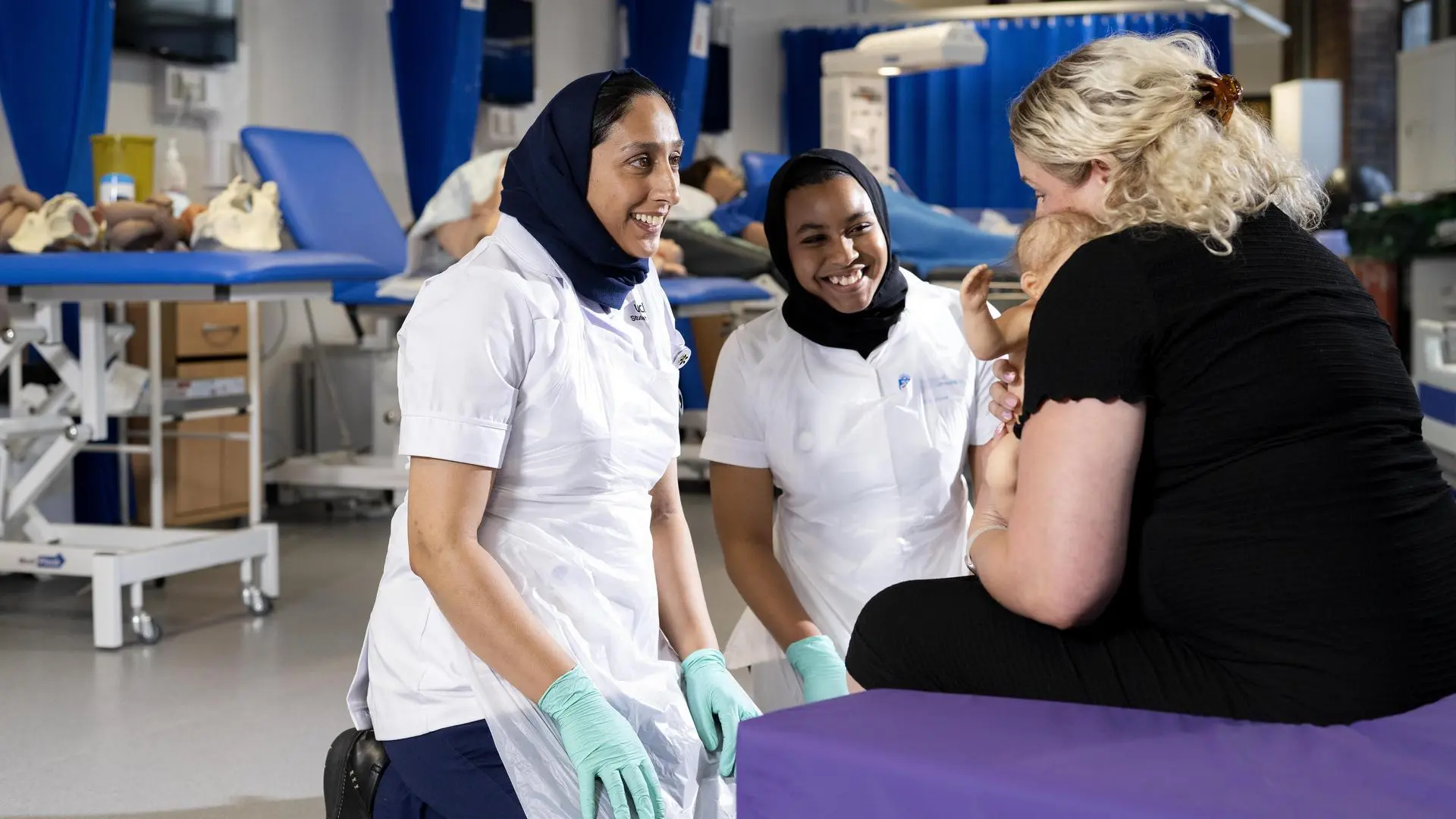In this article, we'll cover:
- What is a midwife?
- Responsibilities of a midwife
- How to become a midwife in the UK
- Why become a midwife
- Frequently asked questions about becoming a midwife
Key facts
- The average starting salary for a newly qualified midwife in 2024 is £28,407 according to Prospects
- If you study a degree to become a midwife, you get a training grant of up to £5,000 per year from the NHS Learning Support Fund (LSF). You do not have to pay this back.
- You may be expected to work some evenings, weekends and bank holidays.
What is a midwife?
A midwife is a medical expert on antenatal, intrapartum and postnatal care. In other words, midwives provide care for patients throughout their pregnancy, during labour and after birth.
As a midwife you’ll build knowledge and develop skills that will help you to support women and families. This will enable you to safely assess and screen women throughout their pregnancies.
You’ll help women from different cultures and religions, as well those from difficult backgrounds. Communication skills are essential as you’ll need to explore sensitive topics with women and families. You’ll work as part of a multidisciplinary team to ensure safe care is provided.
After completing your course, you'll need to register with the Nursing and Midwifery Council (NMC). The NMC ensure that all midwives uphold professional standards and remain up to date with their current training.
Responsibilities of a midwife
As a midwife, you'll provide essential antenatal and postnatal care. You'll help expectant mothers make decisions about the support and services they access during pregnancy and labour. Post-birth, you'll continue to provide advice and health education until care transfers to a health visitor.
You're responsible for both the health of mother and baby. You'll only refer to doctors and other medical professionals if there are medical complications. Midwives work in multidisciplinary teams in hospital and community healthcare settings. Community health care settings include can include midwife-led units (either standalone or alongside a hospital) and the home.
Your daily duties as a midwife could include:
- Monitoring and examining women during their pregnancy, birth and postnatally
- Providing full antenatal care, including examinations, running clinics, screening tests, and parenting classes
- Creating and assessing programmes of care for individuals
- Identifying high risk pregnancies and making referrals to doctors and other medical specialists
- Providing counselling and advice before and after screening and tests
- Providing support and advice following events such as termination, miscarriage, stillbirth, neonatal abnormality and neonatal death
- Supervising and assisting mothers in labour
How to become a midwife
There are a few options you can take to become a midwife. You will have to complete a Bachelor's degree (BSc) course to quality and register with the NMC. This usually means you will have to go to university - or attend a partner institution awarding bachelor's awards.
Undergraduate degree
Most people looking to get into midwifery will complete a university degree. These degrees are approved and accredited by the Nursing and Midwifery Council (NMC). At The University of Central Lancashire, that would be our BSc (Hons) Midwifery course.
Our BSc Midwifery course provides you with academic, theoretical and practical skills. On top of this learning, you’ll also complete placements – working with real midwives in real situations. This combination of learning and real-life placements provides you with the experience you need to become a midwife.
Full-time undergraduate degrees in midwifery take 3 years to complete. You will be awarded with a full registration with the Nursing and Midwifery Council. This allows you to apply for and secure job vacancies in midwifery.
Degree apprenticeship
Studying a Degree Apprenticeship is ideal if you want to earn money while working. It's also a perfect opportunity if you’re already working in healthcare and want to become a midwife for your career.
At The University of Central Lancashire, you can enrol on our BSc (Hons) Midwifery – Degree Apprenticeship course.
You learn all the same knowledge and skills as the undergraduate degree, while spending more time in clinical settings during your working hours. Once you have completed your degree apprenticeship, you’ll be registered with the Nursing and Midwifery Council. This allows you to apply for job vacancies in midwifery.
Other options
If you’re already a practicing registered nurse, you can complete a shortened course to earn your midwife registration. This allows you to earn your qualification and registration in a shorter time, usually about 2 years.
At The University of Central Lancashire, we offer the MSc Midwifery (Shortened) course. This provides registered nurses the opportunity to become registered midwives.
Why become a midwife?
Midwifery is a very rewarding career. You’ll build many professional relationships with your colleagues and patients. You will occupy an essential, secure role both in healthcare and society.
If you’re a compassionate person who loves helping people, then midwifery is an amazing career choice. You’ll be helping women and their families, relying on your expertise and knowledge to provide the best care possible for your patients.
Salary
Newly qualified midwives in the NHS start their career on Band 5, starting at around £28,407, according to Prospects.
As you spend more time in your career, you’ll be able to improve your skills through Continual Professional Development (CPD) and specialise in different areas which can allow career progression with the potential to earn a higher salary. With specialisation and experience comes higher salaries, and a consulting midwife on Band 8b can earn up to £75,000.
Frequently asked questions
Midwifery comes with many opportunities, challenges and memories. You'll help women and families through life-changing moments, building professional relationships for years throughout your career. Once you have completed your degree and earned your NMC registration, your future as a qualified healthcare professional will have just begun.
Next steps
- Course
Midwifery, BSc (Hons)

